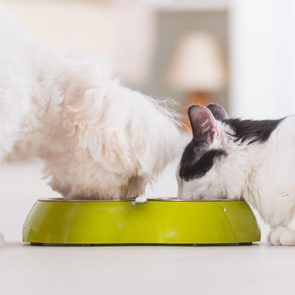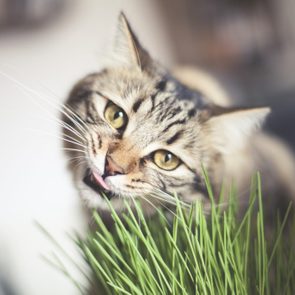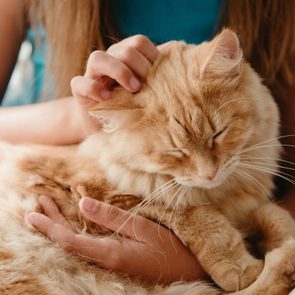Can Cats Eat Cheese? Here’s What Vets Say

Before you share a chunk of cheddar with your favorite feline, here's what you need to consider
Cats and milk—the pairing is everywhere from 19th-century fine-art paintings to Disney movies like The Aristocats. “Crème de la Crème à la Edgar,” the conniving butler says to Duchess and her kittens as he presents the feline family with saucers of dairy in the 1970 Disney classic. But can cats really drink milk? And what about other dairy products? Chances are, you’re probably now also wondering: Can cats eat cheese?
One of the many little-known facts about cats is that most of them are quite lactose intolerant. So does that mean even a tiny piece of Brie should be banned? Or that you can’t sneak Fluffy’s daily thyroid pill into a pinch of provolone? We asked the experts about the best diet for cats and whether it’s OK to treat your favorite feline to an occasional cheesy treat. The answers may surprise you!
Get Reader’s Digest’s Read Up newsletter for more pets, humor, cleaning, travel, tech and fun facts all week long.
Why do cats like cheese?
Cats like cheese for much the same reasons humans do: It’s delicious. “They’re attracted to the creaminess of it,” says Ashlie Saffire, DVM, a veterinarian at the Faithful Friends Veterinary Clinic in Dublin, Ohio. “Cats don’t taste sugar the way we do—they don’t have the taste buds for sweet. But they do like things that are creamy, so [experts suspect] it’s the texture of cheese that they like. And they really love cream cheese.”
Can cats eat cheese?
Yes … but only in small amounts. While cheese isn’t toxic to cats, it can give them an upset belly if they consume too much of it. It’s the same reason cat’s shouldn’t really drink milk. “They don’t have the enzymes in their stomach to break down the lactose that’s in the milk and cheese,” says Dr. Saffire. “So if they have too much, you’re probably going to see some GI problems.”
Interestingly, young kittens do have those enzymes because they need them to digest their mother’s milk. But after they are weaned, cats stop producing them.
The reason for this lactose intolerance? Cats are obligate carnivores, meaning they depend only on meat to survive. “In the wild, when they’re hunting, they’re mostly feeding on birds and mice—so mostly protein,” says Dr. Saffire. “They may also be getting small amounts of grain, but they’re really not getting much dairy at all. So it’s just not something that they need by nature to be able to digest.”
What happens if cats eat too much cheese?
When people who are lactose intolerant consume dairy products, they get upset stomachs, gas or GI discomfort, and in cats, it’s a similar thing, says Dr. Saffire. Here are some of the symptoms cats can develop as a result of eating too much cheese:
- Vomiting
- Diarrhea
- Bloating
- Flatulence
- Constipation
“There might be a handful of cats where it doesn’t bother them at all, but [in most cases], it will probably cause some significant GI issues,” says Dr. Saffire. “For the most part, it’s best to just avoid large amounts of milk or cheese.”
How much cheese is too much for a cat?
For an average-size cat, the max should be a dime-size amount. “Just a little dollop,” says Dr. Saffire. “It’s enough to be a treat but not too much.”
Sometimes owners might want to hide a pill in a little piece of cheese and “that’s totally fine,” says Dr. Saffire. “It’s a great way to get medication into your cat. Even if it’s a pill you have to give every day, it should be fine as long as you use only a little piece of cheese.”
In fact, Dr. Saffire sometimes uses a dab of cream cheese when treating cats in her office. “I’ll smear it onto the exam table and it keeps them busy licking away at it, and they don’t even notice I’m doing an exam or giving a vaccine,” she says. “So it’s really helpful as a treat that way. It’s really all about moderation.”
Should certain cats avoid cheese altogether?
While most cats are fine with occasional cheese treats, it’s important to note that some cats can’t tolerate even small amounts. This is true of cats with a dairy allergy, whose skin breaks out anytime they consume cheese, milk or yogurt. In those cases, avoid cheese completely, says Dr. Saffire.
Owners of cats with weight issues might also want to avoid giving cheese as a treat because of its high fat content, but if it’s the only way to get the cat to take a pill, says Dr. Saffire, it’s worth the trade-off. “If you need to use something for an overweight cat that needs medication, it would probably be fine to use a small piece of cheese to get the medication in them,” she explains. “When you’re looking at what’s the bigger problem, it’s more important to get the medicine in them.”
Of course, if your cat has any chronic medical conditions, it’s best to talk to your vet before giving him anything not on his prescribed diet. “There’s not really any contraindication to cheese, but there are much safer treats out there, like the little crunchy Temptations,” says Dr. Saffire. “Or if you wanted to give your cat a human-food treat, something like canned green beans are an excellent choice. For some reason, cats really like them! Feeding a teaspoon of canned pumpkin would also be another good option. It’s safe to give, and it gives you the satisfaction of feeding them something fun.”
Which cheeses are better for your cat?
Although too much of any cheese is likely to cause stomach upset in a cat, some varieties of cheese have lower levels of lactose, which can make them easier for cats to digest. A general rule of thumb? Hard and semi-hard cheeses tend to be the way to go.
- Cheddar
- Swiss
- Provolone
FYI, Swiss cheese is also low in sodium and fat, so that may make it your top choice if your kitty is a fan.
Which cheeses are worse for your cat?
Experts suggest keeping your cat away from the following varieties of cheese, even in small amounts.
- Ricotta, mozzarella and burrata: These delicious Italian cheeses tend to be high in lactose. According to Dr. Saffire, they’re probably still fine in small doses, but you may run more of a risk here.
- Blue cheeses: That colorful veining in cheeses like Stilton, Gorgonzola and Roquefort is actually mold, which can be dangerous to cats. “You want to avoid anything that has cultures in it,” says Dr. Saffire.
- Raw milk cheeses: Some soft cheeses, like Brie and Camembert, are traditionally made with raw milk, which could contain bacteria and lead to GI problems and possibly even neurological issues like seizures. Though most varieties you see in U.S. supermarkets now contain pasteurized milk, it’s best to check before giving it to your cat.
- Cheeses blended with onions and garlic: While the cheese itself may be fine, onions and garlic are among the foods that can be toxic to cats—and dogs as well.
What should you do if your cat has eaten too much cheese?
While you may be willing to limit the amount of cheese you give to your cat, odds are he won’t show the same restraint if he comes upon an open container of cream cheese on the counter. So what do you do if your cat eats too much cheese? First off, don’t panic. Some cats will digest the cheese just fine. Others may suffer a bout of gastric distress, but the symptoms should resolve themselves as the cheese passes through their system.
“I would expect to see some gas, some diarrhea and maybe some vomiting,” says Dr. Saffire. “But it wouldn’t be toxic. They’ll be OK.” Of course, if the symptoms continue, consult your vet.
About the expert
- Ashlie Saffire, DVM, DABVP, is a veterinarian and the co-owner of Faithful Friends Veterinary Clinic in Dublin, Ohio. She also serves as a director of the American Association of Feline Practitioners.






